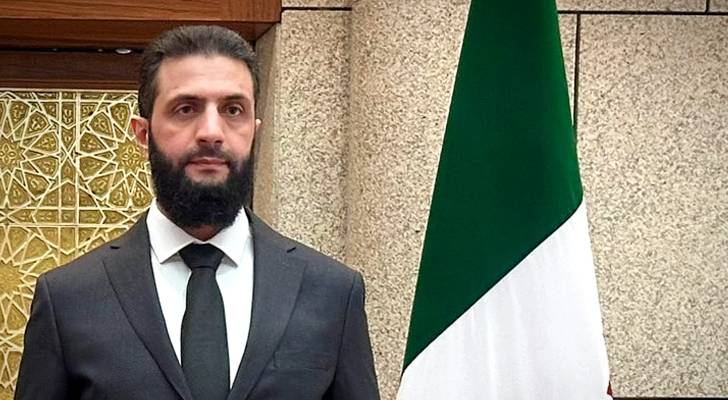Syrian President Ahmed Al-Sharaa
Al-Sharaa: Alawite killings threaten unity, vows to punish those responsible
Syrian President Ahmed Al-Sharaa has warned that the mass killings of Alawite sect members, to which ousted President Bashar al-Assad belongs, pose a significant threat to his efforts to reunite the war-torn country.
Speaking to Reuters Al-Sharaa vowed to punish those responsible for these killings, even if they are “the closest people” to him.
In his first interview with an international news agency after four days of violent clashes between Alawite factions and security forces loyal to the new government, Al-Sharaa blamed Assad-loyal groups, supported by foreign entities, for instigating the deadly events. However, he acknowledged retaliatory killings in the aftermath.
The interview took place at the presidential palace in Damascus, where Assad resided until his ousting by forces led by Shara on Dec. 8, 2024, which forced Assad to flee to Moscow.
“We have emphasized that Syria is a state of law. The law will take its course with everyone,” Al-Sharaa said.
“We came to face this regime, and we arrived in Damascus to support the oppressed people. We will not tolerate any unjust shedding of blood, and we will hold those responsible accountable—no matter who they are, even if they are the closest to us or the farthest. There is no difference. Attacking the sanctity of people, their blood, or their property is a red line in Syria.”
The interview also addressed several issues, including Shara's stance on relations with the United States. He stated that his government had not made any contact with the US since President Donald Trump took office, reiterating his call for Washington to lift the sanctions imposed on Syria during Assad's tenure.
Al-Sharaa expressed the possibility of restoring relations with Moscow, which has supported Assad throughout the war and seeks to maintain two crucial military bases in Syria.
Regarding Israel's Occupation of territories in southern Syria following Assad's ousting, Al-Sharaa rejected "Israeli" criticisms and reaffirmed his intent to resolve issues with Kurdish forces, including meeting with the commander of the Syrian Democratic Forces (SDF), which has long been backed by Washington.
Al-Sharaa held a former military unit loyal to Assad's brother and foreign powers responsible for the recent violence but acknowledged that "many parties entered the Syrian coast, and numerous violations occurred." He described the violence as an opportunity for revenge stemming from long-suppressed grievances, but added that the situation had largely been contained since then.
The Syrian Observatory for Human Rights, a UK-based monitoring group, reported that by Sunday evening, up to 973 Alawite civilians had been killed in retaliatory attacks, following clashes that resulted in the deaths of over 250 Alawite fighters and more than 230 security personnel.
Speaking from the ornate seat of power, Al-Sharaa said, "Honestly, my heart feels heavy in this palace. In every corner of it, I wonder how all this evil came from it toward this society."
The recent unrest, the deadliest wave of violence since Assad's fall, represents a major setback for Al-Sharaa’s efforts to gain international legitimacy, lift US and Western sanctions, and consolidate his rule over a country ravaged by nearly 14 years of war.
Al-Sharaa acknowledged that the violence threatens to derail his national reconciliation efforts. “The events of the past two days will impact this process... and we will try to restore stability as much as we can,” he said.
In response to the violence, Al-Sharaa formed an “independent committee” to investigate the killings and hold the perpetrators accountable within 30 days. A second committee was also established to maintain civil peace and foster reconciliation, “because blood begets more blood.”
Al-Sharaa refrained from commenting on whether foreign fighters, allied Islamist factions, or government security forces were involved in the mass killings, stating that the investigation would determine the facts.
The killings have shaken Latakia, Banias, and Jableh, the main coastal cities, forcing thousands of Alawites to flee to mountain villages or cross into Lebanon.
Al-Sharaa stated that Assad loyalists from the dissolved Fourth Division of the Syrian Army, once led by Assad’s brother Maher, and a foreign allied force were responsible for sparking the violence in an attempt to destabilize Syria and create sectarian strife. He did not specify the foreign power but alluded to parties who have lost out in the new Syrian reality, likely referring to long-time ally Iran, whose embassy in Damascus remains closed.
Al-Sharaa emphasized that security and economic prosperity are directly tied to the lifting of US sanctions imposed on Assad's regime. He also revealed that Moscow and Damascus had agreed to review all previous agreements between the two countries, though they had not yet had time to delve into the details.
“We don’t want there to be a rupture between Syria and Russia. We don’t want the Russian presence in Syria to pose a threat or danger to any country in the world. We want to maintain these deep strategic relations,” Shara added.




